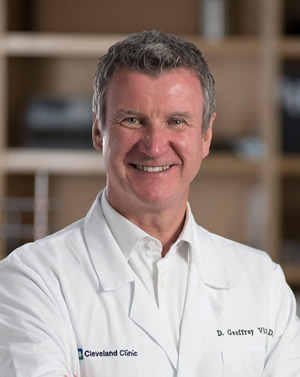Research News
01/07/2020
Using Machine Learning to Better Assess Stroke Risk
With a new award from the Department of Defense, Dr. Vince will use non-invasive ultrasound and a novel artificial intelligence algorithm that predicts carotid artery plaque composition to detect patients at high risk of future stroke.

D. Geoffrey Vince, PhD, Chair, Department of Biomedical Engineering, has received a four-year, $4 million grant from the Department of Defense to study the relationship between the composition of carotid artery plaque and the risk of a future cerebrovascular accident (CVA) (i.e., stroke).
Ischemic stroke (blockage of blood flow in the brain) makes up nearly 90% of CVAs. Although the degree of the blockage and the size of the plaque are important, Dr. Vince and his team believe that composition is a much better measure of plaque vulnerability (likelihood of causing a stroke) and risk of future stroke.
Currently, carotid artery plaque composition is determined using magnetic resonance imaging, which can be costly and is not always available. With this grant, the researchers will investigate the combined power of ultrasound together with a new machine learning algorithm to better, and non-invasively, assess plaque composition.
In this study, 1,500 patients with carotid artery stenosis from Cleveland Clinic and the Louis Stokes Cleveland Veterans Affairs Medical Center will undergo ultrasound of their carotid arteries. In tandem, a new program called the Compositional Analysis System by Machine (CASM) learning algorithm will create three-dimensional reconstructions of the plaques. The investigators will test the CASM algorithm’s ability to accurately determine the degree of stenosis and predict the precise plaque composition.
This new method to measure plaque composition would be much less expensive and easily accessible to all patients. Ultimately, the goal of the research is to gain approval from the Food and Drug Administration to use the CASM algorithm for the clinical assessment of stroke risk.
“We feel that there is a need for a non-invasive point-of-care tool to determine plaque composition,” Dr. Vince says. “With the CASM algorithm, we believe we can improve risk assessment and monitoring of carotid plaque. Our goal is to have this algorithm integrated into everyday clinical use.”
The study will also look for any association between diabetes and the non-invasive ultrasonic measure of carotid plaque composition. Diabetes is a significant risk factor for atherosclerotic carotid stenosis. Diabetic patients may have plaque that is softer and more pliable, thus increasing the likelihood of an ischemic stroke (as compared to non-diabetic patients with similar amounts of plaque).
The investigators believe CASM may enable clinicians to better monitor patients who are taking medications for diabetes and assess their effects on the composition of carotid artery plaque.
“This research is especially significant for the healthcare and well-being of veterans,” comments Dr. Vince. “We know that about 20% of veterans have diabetes, and smoking rates are especially high among vets—both of which contribute to CVA risk. We are excited to collaborate with our colleagues from the VA to help provide care to this population.”
Dr. Vince is the Lois Kennedy Endowed Chair in Biomedical Engineering and Applied Therapeutics.
Photo: Ultrasound image of the carotid artery. CASM will create three-dimensional reconstructions of plaques found in ultrasonic images like these.
Featured Experts
News Category
Related News
Research areas
Want To Support Ground-Breaking Research at Cleveland Clinic?
Discover how you can help Cleveland Clinic save lives and continue to lead the transformation of healthcare.
Give to Cleveland Clinic